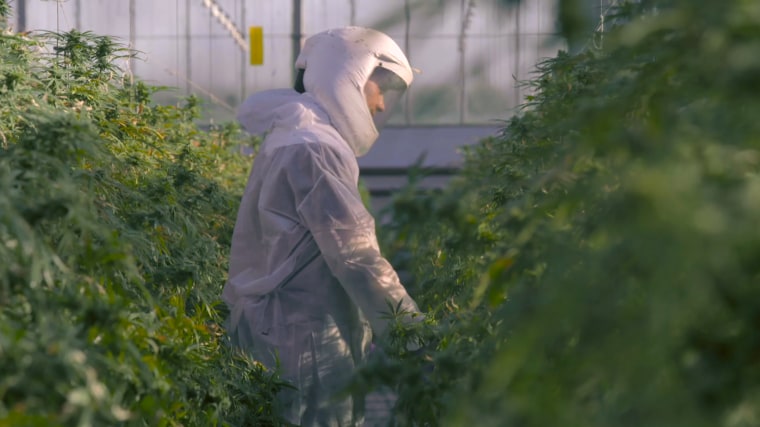Supporters say cannibidiol, which comes from the hemp plant, can treat pain, anxiety, inflammation and even cancer. But it might just be snake oil.

By Linda Carroll, John Torres, M.D. and Ali Galante
Touted
as a treatment for a wide range of conditions — including anxiety,
pain, inflammation and even cancer — CBD may be the latest version of
snake oil. Or perhaps a real relief for numerous ailments.
Nobody really knows which is true because there has been so little solid research on CBD's effect on humans, experts say.
CBD,
or cannabidiol, comes from the hemp plant, a close relative to another
member of the cannabis family, marijuana. Both plants contain abundant
types of cannabinoids, but marijuana is high in the psychoactive
chemical THC, while hemp is rich in CBD, which doesn’t create a buzz but
may offer a range of medicinal benefits.
Even
without research to back it up, the trendy CBD has been turning up in a
vast array of products, including CBD-infused lattes, massage lotions
and baked goods. And that means it’s becoming big business, with sales
expected to hit $20 billion in the next few years.
Thus
far, there is only one use for CBD approved by the Food and Drug
Administration, and that’s as a treatment for two rare forms of
epilepsy. But that doesn’t stop true believers like Dr. Joseph Cohen,
who runs a cannabis clinic in Boulder, Colorado, from making
enthusiastic claims.
“It works for anxiety, it works for
pain, it works for inflammation, it works for autoimmune disorders, and
there's a slew of other conditions for which you can get benefit,” said
Cohen, a former gynecologist.
There’s
no clear evidence that CBD works for any of those things, experts told
NBC News.
“We don’t know any of that,” said Dr. Margaret Haney, a
professor of neurobiology at Columbia University Medical Center and
director of Columbia’s Marijuana Research Laboratory.
“There’s
an enormous placebo effect,” she said. "If you go in with this
expectation, with all of society saying this will cure whatever ails
you, it often will."
Dr. Jeffrey Chen seconds that
opinion. “Certainly there is therapeutic potential from CBD, but the
amount of human data is minuscule, and popular access and consumption
have far outpaced the science,” said Chen, executive director of the
Cannabis Research Initiative at the University of California, Los
Angeles. “So if you’re going to take it, you have to understand there is
little data and you have to be very careful about the source and you
need to talk to your doctor about how it might interact with other drugs
you are taking.”
With
no one regulating cannabinoids, you often can’t be sure what dose
you’re actually getting, Chen said. He recommends buying from medical
marijuana dispensaries, which are regulated by local governments.
While
FDA testing of CBD for use in epilepsy showed that the chemical was
relatively safe and free of side effects, it does appear to interact
with other drugs, including antidepressants known as SSRIs and blood
thinners, boosting their levels in a person’s system because it inhibits
an enzyme that breaks them down, Chen said.
Studies in
animals suggest that CBD might help with anxiety, pain and inflammation,
but Chen is quick to point out that “the majority of times when we see
promising drugs in animals they either don’t work in humans or they have
horrible, horrible side effects.”
One
thing experts do know is that unlike THC, CBD doesn’t hook onto
cannabinoid receptors in the brain or body, said Michael Zemaitis, a
professor of pharmaceutical sciences at the University of Pittsburgh.
Instead, it appears to affect enzymes that break down endogenous cannabinoids — the ones made by our own bodies.
“It
seems to have a very broad dampening effect,” Zemaitis said. “That’s
part of the reason why you see so many indications” for their use.
In
that sense, the effects of CBD are very different from those of
opioids, which have specific receptors to plug into, turning on cell
machinery in much the same way a key in a car ignition turns on the
engine.
There is little information about the medicinal
effects of both THC and CBD, mainly because of federal laws on
marijuana, experts said. Marijuana and its extracts have long been
considered Schedule 1 drugs, defined as having no accepted medical use
and a high potential for abuse.
That puts any kind of
cannabis in the same category as heroin and LSD, which means researchers
have to jump through a lot of hoops to even get any cannabinoids to
study, Chen said.
Another big concern for experts is that patients will avoid proven medications in favor of CBD.
“We
have a long history of people using snake oil to convince people
they're getting something,” Haney said. “Then there have been more
dangerous situations where people turn down effective medications" to
use unproven products, like CBD.
Things may change soon when it comes to CBD, Chen said. The 2018 Farm Bill
contains language that will change the status of hemp-derived
cannabinoids from Schedule 1 to Schedule 3, he said, “so we’ll be able
to start generating data on what it will work for and what it will not.”

No comments:
Post a Comment